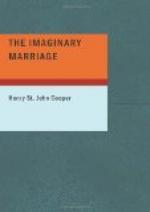They rose early at Buddesby. Constance had been at her housewifely duties since soon after six. Only Ellice had lain abed till the ringing of the breakfast-bell.
“A letter from Helen,” Constance said.
“Helen? Oh, she’s got to Starden then?” said John.
“And wants us to come over, dear.”
“Of course! We’ll go over next week some time. I’m busy now with—”
“It wouldn’t be kind not to go at once.”
“Who is Helen?” demanded Ellice. She looked fierce-eyed at Connie and then at John. “Who is she?” A tinge of colour came into her cheeks.
Connie saw it, and sighed a little. She knew this girl’s secret, knew it only too well. Many an hour of anxiety and worry it had caused her.
“Helen is our aunt by marriage,” she said.
“Oh!” Ellice said, “I thought—”
John laughed. He had a jolly laugh, a great hearty laugh that did one good to hear.
“What did you think she was, gipsy girl?” he asked, for “gipsy” was his pet name for the little dark beauty.
“Did you think she was some young and lovely damsel who was eager to meet me again?”
“I should hate her if she was!” the girl said, whereat John laughed again.
“Write to Helen, Con,” he said as he rose from the table, “and say well come over to-morrow.” He paused, frowning, at thought. “I’ll manage it somehow. I’ll drive you over in the trap. It would be useful to have a car; I don’t know why I put off getting one.”
Constance did, and she smiled. “Wait till next year, dear.”
He nodded. “Yes, next year we’ll get one. Meanwhile write to Helen, and tell her we’ll be over to-morrow afternoon.”
“And I?” Ellice asked.
John looked at her. “Why—no, child, you’ll stop at home and look after the house, eh?” He nodded to them and went out.
“Is she there—alone?” Ellice asked.
“Who, dear?”
“This Helen, your aunt. Is it usual to call your aunt just plain Helen?”
“No, I suppose it isn’t, and she is not there alone, as you ask. She is living with a girl who has just come into a great deal of money—Miss Joan Meredyth.”
“What is she like?” the girl asked quickly.
Constance smiled.
“I don’t know, dear. You see, I have never seen her.”
“Then I hope,” Ellice said between her clenched teeth, “I hope she is ugly, ugly as sin!”
“I think,” said Constance gently, “that you are very silly and foolish!”
Yet when the morrow came it was Ellice and not Constance who sat beside John in the trap, and was driven by him the six odd miles to Starden. For Constance had one of “her headaches.” It was no imaginary ailment, but a headache that prostrated her and filled her with pain, that made every sound an agony. She lay in her room, the blinds drawn, and all the household hushed.
“I’ll write that we’ll go to-morrow, dear,” John said.




